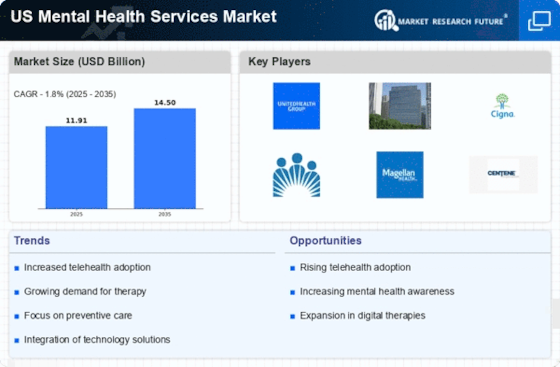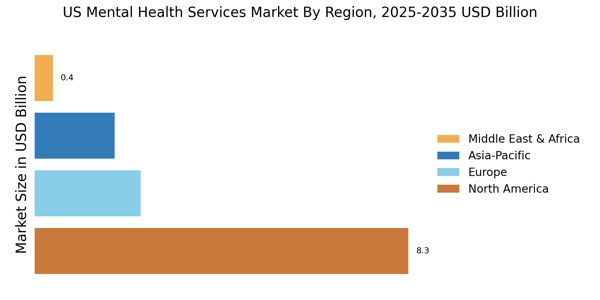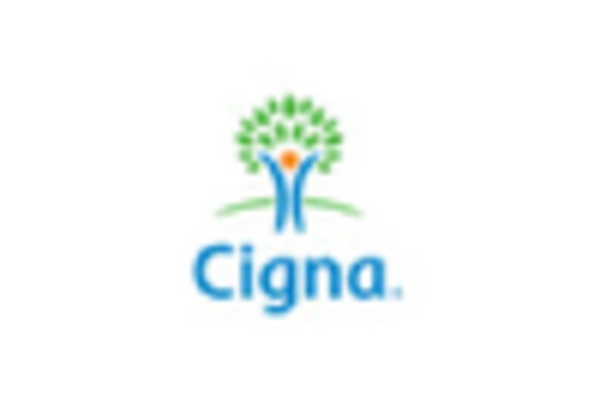Policy Changes and Increased Funding
Recent policy changes and increased funding for mental health services are driving growth in the US Mental Health Services Market. Legislative efforts aimed at improving mental health care access, such as the Mental Health Parity and Addiction Equity Act, have mandated that mental health services be covered by insurance plans on par with physical health services. Additionally, federal and state governments are allocating more resources to mental health initiatives, with funding for mental health programs increasing by approximately 10% in the last fiscal year. This financial support is likely to enhance service availability and quality, encouraging more individuals to seek help. As policies continue to evolve, the US Mental Health Services Market is expected to benefit from a more robust infrastructure and increased public awareness of available resources.
Focus on Holistic and Integrated Care
The focus on holistic and integrated care models is emerging as a key driver in the US Mental Health Services Market. There is a growing recognition that mental health is interconnected with physical health, leading to a more comprehensive approach to treatment. Integrated care models, which combine mental health services with primary care, are gaining traction, as they allow for more coordinated and effective treatment plans. Research suggests that patients receiving integrated care experience better health outcomes and higher satisfaction rates. This shift towards holistic care is likely to encourage more individuals to seek mental health services, as they perceive a more supportive and comprehensive approach to their well-being. Consequently, the US Mental Health Services Market may witness a transformation in service delivery, emphasizing the importance of treating the whole person.
Technological Advancements in Treatment
Technological advancements in treatment modalities are reshaping the landscape of the US Mental Health Services Market. Innovations such as mobile health applications, virtual reality therapy, and artificial intelligence-driven diagnostics are enhancing the accessibility and effectiveness of mental health care. For instance, the use of teletherapy has surged, with a report indicating that telehealth visits for mental health services increased by over 50% in recent years. These technologies not only facilitate remote access to care but also provide personalized treatment options, which may lead to improved patient outcomes. As technology continues to evolve, it is likely that the US Mental Health Services Market will see an influx of new tools and platforms designed to meet the diverse needs of patients, thereby expanding the reach of mental health services.
Increased Awareness of Mental Health Issues
The growing awareness of mental health issues among the general population appears to be a significant driver of the US Mental Health Services Market. Campaigns aimed at reducing stigma and promoting mental health literacy have led to more individuals seeking help. According to the National Institute of Mental Health, nearly one in five adults in the US experiences mental illness each year, which translates to approximately 51.5 million people. This heightened awareness is likely to increase demand for mental health services, as individuals recognize the importance of addressing mental health concerns. Furthermore, educational initiatives in schools and workplaces are fostering environments where mental health discussions are normalized, potentially leading to a surge in service utilization. As a result, the US Mental Health Services Market is poised for growth as more individuals seek treatment and support.
Rising Prevalence of Mental Health Disorders
The rising prevalence of mental health disorders is a critical driver of the US Mental Health Services Market. Data from the National Institute of Mental Health indicates that conditions such as anxiety disorders, depression, and substance use disorders are becoming increasingly common, affecting millions of Americans. This trend is likely to result in a greater demand for mental health services, as individuals seek treatment for these conditions. Furthermore, the increasing recognition of mental health as a vital component of overall health is prompting healthcare providers to prioritize mental health services. As the prevalence of mental health disorders continues to rise, the US Mental Health Services Market is expected to expand, with more resources allocated to meet the growing needs of the population.


















